 |
|
Meet a real Dentist, Ilias Alevizos
|
 |
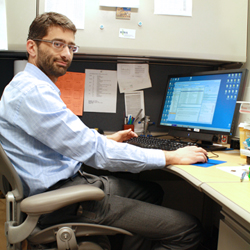
|
|
Ilias Alevizos, Dentist, Assistant Clinical Investigator, National Institute of Dental and Craniofacial Research, National Institutes of Health
|
1. I chose this career because...
2. My typical workday involves...
3. What I like best/least about my work…
4. 4. My career goals are…
5. 5. When I’m not working I like to…
6. Go For It!
|
|
1. I chose this career because...
|
Back to Top

|
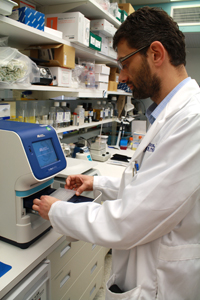
|
|
Ilias Alevizos uses a machine to perform a version of real-time polymermase chain reaction (RT-PCR), which measures the RNA expression levels of a gene.
|
I chose to become a Dentist because of a discovery in undergraduate school. When I first entered school, I was interested in engineering. But my interest turned to dentistry when I took a biology class and discovered the need for more oral research. At the time, it was a hot topic. I believed that dental school could train me on the basics of oral tissues and diseases, from which I hoped to expand knowledge through my own research.
My career is not that of a typical dentist. My specialty is in oral pathology, focusing on disease diagnosis and the underlying causes of oral diseases. I am a clinical investigator with a basic science lab at the National Institute of Dental and Craniofacial Research (NIDCR). I am interested in translational research, also known as bench to bedside research. The aim is to turn basic scientific discoveries into better diagnosis and treatment of disease. Understanding a disease at a basic level through studying patients, their clinical problems and needs, might be the most effective way to contribute to treating or preventing the disease.
College Education & Training
- Doctor of Dental Medicine, School of Dental Medicine, Tufts University, Boston, Massachusetts
- Master of Medical Sciences, Oral and Maxillofacial Pathology, Harvard School of Dental Medicine, Harvard University
- Post Doctoral Fellowship, Massachusetts Institute of Technology, Cambridge, Massachusetts
- Post Doctoral Fellowship, University of Padova, Italy
- Clinical Fellowship, National Institute of Dental and Craniofacial Research, National Institutes of Health, Bethesda, Maryland
|
|
2. My typical workday involves...
|
Back to Top

|
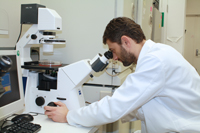
|
|
Ilias Alevizos looks at cultured cells from salivary glands that were treated with nucleotides.
|
My typical workday involves clinical activities in the morning and laboratory research in the afternoon. My focus is on xerostomia, the clinical name for dry mouth due to lack of saliva. It can be a symptom of an underlying disease, such as Sjögren’s syndrome (an autoimmune disease that affects tear and saliva production). In the clinic, we try to identify the underlying reasons for oral dryness, which varies from patient to patient, and to provide treatment.
My clinical responsibilities in the Sjogren's syndrome clinic include xerostomia consults to other institutes, and guiding and participating in protocols such as the one involving gene therapy for radiation-induced damaged salivary glands. There are about 15 patients participating in the clinical trial. We are using a viral vector that carries a gene into the salivary gland that may improve its function.
In between and after the end of my clinical responsibilities, I spend most of my time in my basic science lab, meeting with the staff and doing some experiments. My research focus is on salivary gland dysfunction, and looking for biomarkers of disease.
Did I forget to mention meetings and presentations? Those are abundant during the week as well! We have regular branch meetings and clinical rounds. I also do presentations about my work to other groups at the National Institutes of Health (NIH) or at professional conferences.
|
|
3. What I like best/least about my work…
|
Back to Top

|
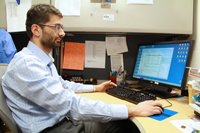
|
|
Ilias Alevizos sits at his desk to check email, review data and analyze experimental results.
|
What I like best about my work is doing translational research and bridging patient needs with basic science. It is an effort to benefit the patient as much as possible. That is what I like the most.
What I like least about my work is when I don’t have anything to offer a patient for symptom relief, treatment, or a cure. In some cases, there is not enough known about the disease, or there has not been enough research to provide an effective intervention.
|
|
4. 4. My career goals are…
|
Back to Top

|
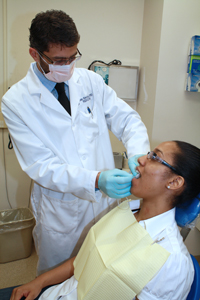
|
|
In the clinic, Ilias Alevizos collects saliva from a patient.
|
My career goals are to substantially contribute to the clinical and scientific efforts to generate effective interventions for oral diseases. To reach these goals, I will have to raise the level of interest of other scientists about oral diseases. More than getting high positions in academia or the government, I would like to be a good mentor and a respected scientist and clinician.
|
|
5. 5. When I’m not working I like to…
|
Back to Top

|
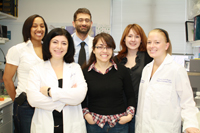
|
|
Ilias Alevizos poses with his colleagues in the lab.
|
When I’m not working, I like to spend time with my son! I enjoy cooking as well, and preparing elaborate dishes when time permits. Before bedtime, I like reading non-scientific literature.
|
|
6. Go For It!
|
Back to Top

|
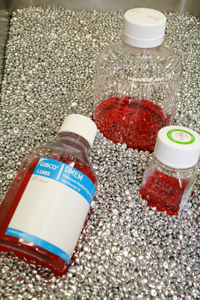
|
|
| |
Before feeding cell cultures with new media, it is warmed in a waterless bead bath.
|
Although my dental career is not a typical one, I feel my studies have uniquely positioned me to do what I like the most. If you have an interest in oral diseases and an opportunity to contribute to the research, then definitely go for it!
|
|
|
|
 |